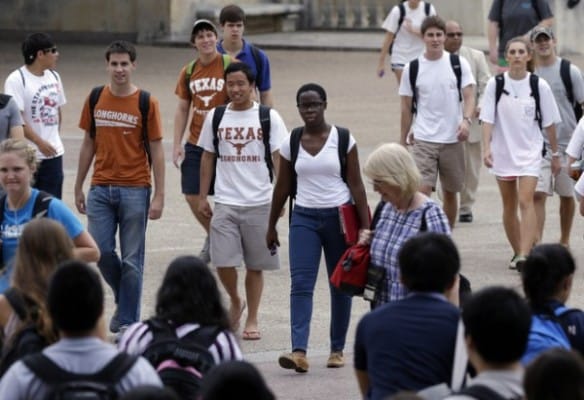SCOTUS Questions Necessity of Race in Establishing Diverse Campuses
Credit: ThinkProgress

The U.S. Supreme Court declared on Monday it would send the Fisher v. University of Texas at Austin case back to the Fifth Circuit Court of Appeals for review. In a 7-1 ruling, the court upheld the University of Texas' decision to use race in the admissions process.
However, SCOTUS compelled the lower court to further elaborate the need for affirmative action and discover if using race is the only way to achieve UT-Austin's mission of a diverse student body.
The case originated from a 2008 lawsuit against the University of Texas-Austin by Abigail Noel Fisher, a then-high school senior from Sugar Land, Texas after her college application was rejected. Fisher claimed the university's use of race in its general admission process disadvantaged her as a white student, citing that the statute favored what she perceived to be less qualified students of color for admission.
UT-Austin defended its admission practices, stating that Fisher did not qualify for the automatic admission of the state's high school students in the top ten percent of their classes, leading her to the general admission pool which evaluates UT hopefuls on a case-by-case basis.
The university also stated that its policy considered race as one of many factors, such as test scores, extracurricular activities, and leadership experience, all in the interest of creating a diverse student body.
Affirmative action is no stranger to the Supreme Court. In 2003, the Supreme Court upheld the University of Michigan Law School's use of race in its admissions process in Grutter v. Bollinger. The court stated the practice ensures underrepresented students of color -- who otherwise would not be equally represented in the incoming class due to historical discrimination -- are present in meaningful numbers in the student body.
Ten years later, however, the pressure was placed on the lower courts to evaluate if race was truly necessary to create a holistic student body. In the court's ruling, Justice Anthony Kennedy stated:
"Strict scrutiny imposes on the university the ultimate burden of demonstrating, before turning to racial classification, that available, workable race-neutral alternatives do not suffice."
Justice Ruth Bader Ginsburg was the lone dissenter. She argues:
"I would not return this case for a second look. As the thorough opinions below show, the University's admissions policy flexibly considers race only as a "factor of a factor of a factor of a factor" in the calculus..."
With 78 percent of Americans opposing the use of race in college admission standards, according to an ABC News/Washington Post poll, the thought of a potentially biased evaluation process poses a threat to the millions of higher education hopefuls competing for narrowing spots at premier universities in America.
White students are, at least, twice as likely to enroll in college than their Black and Latino counterparts. Proponents of affirmative action say the practice ensures that systematic and historic disadvantages that cause students of color to enroll in lower numbers do not serve as a barrier to their higher education goals.



